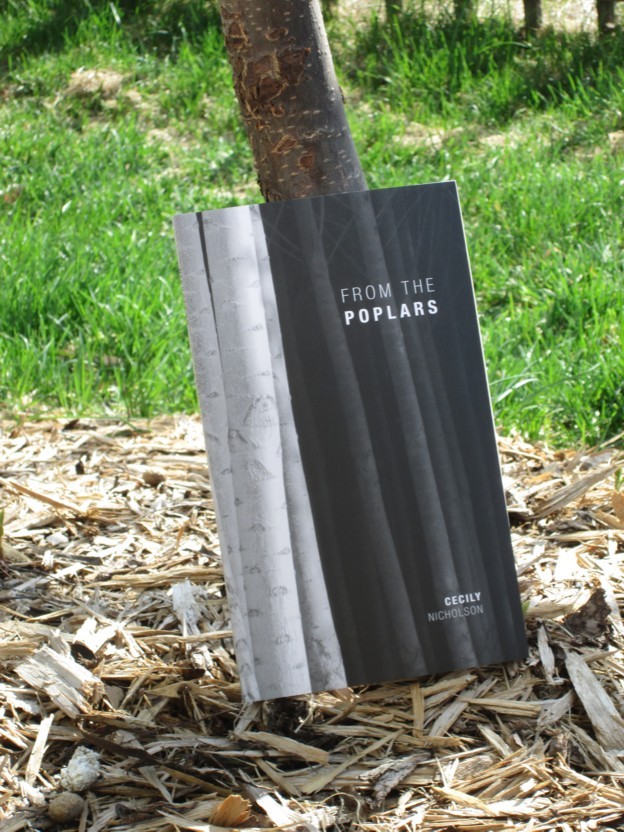
Geomantic riposte: 'From the Poplars'

Cecily Nicholson is the administrator of Gallery Gachet and has worked with women of the Downtown Eastside neighbourhood of Vancouver, BC since 2000. Her work, both creative and social, engages conditions of displacement, class, and gender violence. Nicholson is the author of Triage and From the Poplars, and is a contributor to Anamnesia: Unforgetting. In a Jacket2 interview with Jules Boykoff, Nicholson spoke about her first book Triage:
I realize that the book has become a tangible point of entry for me to level critique, roundly, that includes myself. I think that my experiences and mobility are pretty limited. For the text to be grounded it necessarily contains my everyday life, including paid work and organizing. I prefer poetry that documents, witnesses, reveals structure, talks back and raises questions in ways that are not closed or irrelevant to my friends, family, allies. I’ve learned to reference cultural production with a specific interest in its process and public, and not simply the object/outcome. I relate best to work being produced under hard conditions and in active solidarity with directly impacted communities. If my poetry is relevant to the work of organizing then that’s a fortunate convergence.
Nicholson’s latest book From the Poplars, traces multiple layers of historical memory, the site-specific poetic sediment on an uninhabited island in New Westminster, BC, an unmarked, twenty-seven and a half acres of land held as government property that is known as Poplar Island. The traditional territory of the Qayqayt First Nation, it was later to be quarantine for indigenous smallpox victims, and then clear-cut for shipbuilding during the First World War. Reminiscent, at least in spirit if not form, of Gary Snyder's Turtle Island, what is most unique and refreshing about Nicholson’s book is the amount of lyrical complexity she maintains throughout her activist solidarity, in which her meticulous reportage allows language itself to reveal the cruel ironies and paradoxes of our place in the world, even at a place we pass every day in transit without ever really seeing it.
From the Poplars by Cecily Nicholson (Talonbooks, 2014, Page 26)
sweat to wools loading cargo
cannery crates of sturgeon and roe
packing it in at the company’s dock
garden at homes
canning
moorage, a snag in the water
before plastic
bridges, small-dot passages
centre-span arch under construction
devastated, may day, temporary stores
after the fire
ARBRE DE MAI COSMIQUE
pictured at the centre of the image: the Onward
Geomantic Riposte: Company Romance*
with all the means in his power so that the C_’s enter-
prises should not fail the C_ exhorted them to devote
themselves to activities more profitable than such fruit-
less war parties the C_ found it necessary for fear of
eventual failure the C_ was preoccupied with Canadian
penetration did the C_ succeed in imposing its tutelage
over those territories the double plan that resulted
in the C_’s creation the C_ was concerned the C_
did not contemplate remaining entirely immobile in
this fragmentation of [the C_’s] forces the C_’s officers
refused to believe in the existence of horses the C_’s
adversaries the C_ was to escape for a while the C_
itself hampered the C_ resumed possession the C_
gradually turned away forbidden access to the C_’s the
C_ set out to stabilize its positions in the interior the
C_’s tardy entry that in size equalled the C_’s enterprises
were inspired by the idea of Protestant crusade the C_
in fact never completely overcame its feeling of mistrust
toward the native peoples contested openly the legality
of the charter held by the C_ and the right the C_ invoked
to sole occupation of the territories the C_ does not seem
to have taken account of difficulties service in the interior
involved
* courtesy of The Métis in the Canadian West, Volume I
by Marcel Giraud (translated by George Woodcock)